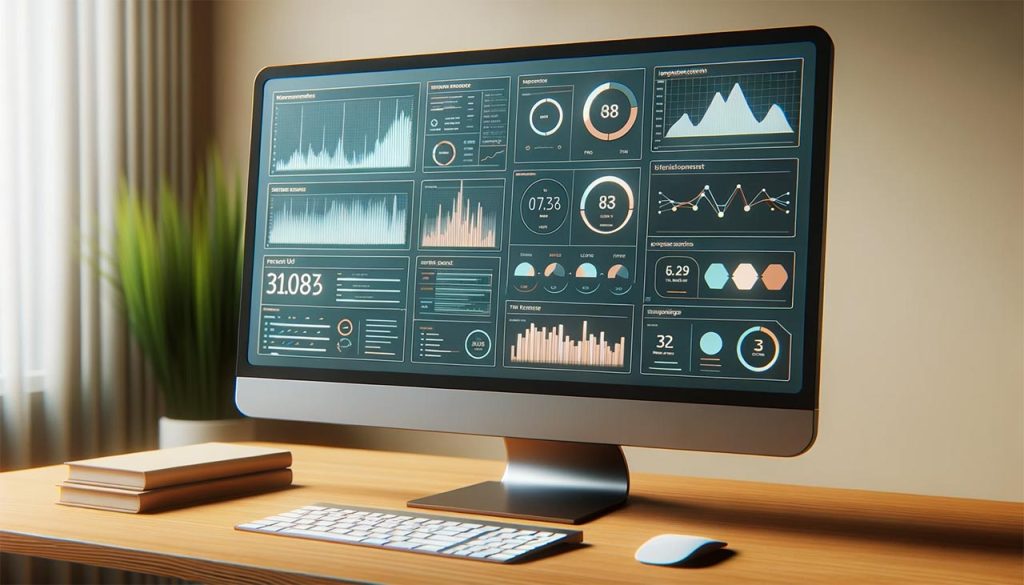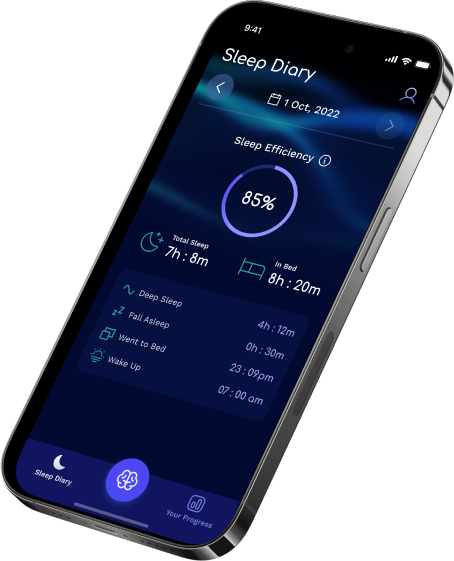
Sleep, for the average healthy person, is something they don’t think too much about. It’s simply something they do every night.
And yet, even the average person still pays close attention to two things: what time they go to bed and what time they wake up.
These are examples of sleep metrics.
And even though these may be the two most important metrics people care about, sleep is made up of many parts., and they are also worth paying attention to.
In this article, I will explain what they are, why they matter, and how you can use this information pragmatically.
🔎 Feel free to jump to your preferred section in this article:
1. Sleep Metrics
» 1.1 Bedtime
» 1.2 Sleep Onset Latency
» 1.3 Wake Up Time
» 1.4 Time Attempting to Sleep After Final Awakening
» 1.5 Get Up Time
» 1.6 Time Spent in Bed
» 1.7 Total Sleep Duration
» 1.8 Sleep Efficiency
» 1.9 Number of Awakenings
» 1.10 Wakefulness After Sleep Onset
» 1.11 Onset and Wake Variance
» 1.12 Time Spent in Sleep Stages
» 1.13 Sleep Quality
» 1.14 Heart Rate Variability
» 1.15 Average Resting Heart Rate
2. Characteristics of Good Sleep Quality
1. Sleep Metrics
In this section, you will find all relevant sleep metrics.
1.1 Bedtime
Definition: the time when you go to bed.
As mentioned in the introduction, this is one of the metrics most people pay attention to.
Depending on the person’s chronotype (i.e., if they are a morning person or a night owl), their preferred Bedtime will be earlier or later in the night.
As a general rule, it is recommended to consistently go to bed at the same time every night, even during the weekends, to improve other sleep metrics.
1.2 Sleep Onset Latency
Definition: how long it takes to fall asleep after closing your eyes.
For an individual who doesn’t suffer from sleep onset insomnia, a normal Sleep Latency is between 2 – 15 minutes, even though the numbers may vary from night to night.
Factors such as stress, anxiety, pain, or changes in Bedtime will affect this metric. If Sleep Onset Latency exceeds the 20-minute mark, it’s best to get up and do something boring or relaxing.
1.3 Wake Up Time
Definition: the time when you wake up without falling asleep again.
This is the sleep metric everyone pays the most attention to whenever they set up their alarm clocks for the following day ⏰
As a general rule, it is recommended to consistently wake up at the same time every day, even during the weekends, to improve other sleep metrics.
1.4 Time Attempting to Sleep After Final Awakening (T.A.S.A.F.A.)
Definition: how long you spend trying to fall back asleep after waking up for the last time during the night.
A healthy individual who wakes up when the alarm clock goes off in the morning and gets up without intending to fall asleep again has these metrics:
- T.A.S.A.F.A. ≈ 0 minutes.
- Wake Up Time ≈ Get Up Time.
Individuals suffering from Early Morning Awakening Insomnia will likely spend lots of time trying to fall asleep before finally deciding to get out of bed. In these cases:
- T.A.S.A.F.A. > 0 minutes
- Wake Up Time ≠ Get Up Time.
1.5 Get Up Time
Definition: the time when you get out of bed.
As mentioned previously, for people with no sleep problems, the Get Up Time is usually the same as the Wake Up Time.
Practically speaking, having a Wake Up Time = Get Up Time means waking up whenever the alarm clock goes off and having no intentions to sleep any further after that point.
1.6 Time Spent in Bed
Definition: how much time you spend in bed, starting counting from Bedtime up until Get Up Time.
Time Spent in Bed is not the same as Time Spent Asleep because there are instances where you will be in bed awake (e.g. Sleep Onset Latency and Wakefulness After Sleep Onset).
So, the formula for time spent in bed is the following:
- Time Spend in Bed = Get Up Time – Bedtime
Q: What if I spend 1 hour watching a Netflix series in bed before going to sleep?
This sleep metric does not consider those activities, so you don’t have to worry about them ruining your sleep efficiency score.
1.7 Total Sleep Duration
Definition: the amount of time you actually spend sleeping.
This is a fundamental sleep metric since plenty of studies show how a short Total Sleep Duration can result in sleep deprivation, affecting physical and mental health and performance (read more about it here).
Generally, the average healthy adult’s recommended total sleep duration is between 7 and 9 hours per night. Here is a table with the CDC recommendations for your future reference.
The formula for the total sleep duration per night is:
- Total Sleep duration = (Wake Up Time – Bedtime) – Sleep Onset Latency – Wakefulness After Sleep Onset
💡 Individuals who have never tracked their sleep might be in for a surprise regarding this metric since it is often shorter than what they expected. This may explain why they sometimes “sleep 8 hours, but still feel tired”. This was the first thing I discovered about my sleep when I started using LucidLink.
1.8 Sleep Efficiency
Definition: the ratio between the time you spend asleep and the total time you spend in bed
The formula for the total sleep duration per night is:
- Sleep Efficiency = Total Sleep Duration / Time Spent in Bed
For example:
- You go to bed at 00:00 and wake up at 08:00
- You take 15 minutes to fall asleep
- You spend a total of 45 minutes awake during the night
- So you spend 8 hours in bed and sleep 7 hours.
- 7 hours / 8 hours = a sleep efficiency of 87.5%
85% is typically considered the acceptable minimum value for the Sleep Efficiency metric.
1.9 Number of Awakenings
Definition: number of sleep interruptions that occur after the initial sleep onset.
Waking up during the night is common among people, but it usually happens for just a few seconds, and the person will not remember it. This can be considered a normal occurrence, just a consequence of going through a lighter sleep phase.
However, suppose the number of awakenings is more than just a couple per night, and it’s caused by disruptive factors like abrupt noises, anxiety, the need to go to the bathroom, or sleep disorders like Restless Legs Syndrome. In that case, it can start interfering with your sleep quality and total sleep duration, inducing you into a sleep-deprived state.
1.10 Wakefulness After Sleep Onset (W.A.S.O.)
Definition: how much time you spend awake during the night after falling asleep.
This sleep metric is related to the previous one. The difference is that the Number of Awakenings refers to the number of sleep disruption occurrences, and W.A.S.O. is the total duration of those occurrences.
A high value means that you are showing signs of sleep fragmentation. Generally, the average healthy individual spends less than 30 minutes awake during the night.
1.11 Onset and Wake Variance
Definition: Onset variance is the difference between your actual Bedtime and your target Bedtime. Wake variance is the difference between your actual Wake Up Time and your target Wake Up Time.
These sleep metrics make sense in the context of sleep goals. If you want a consistent sleep schedule, you can compare those idealized target times with your actual times to see how you compare.
As mentioned, having a consistent sleep schedule (i.e., low onset and wake variance) will likely improve your other sleep metrics. Still, I personally know people to whom this rule of thumb does not apply.
1.12 Time Spent in Sleep Stages
Definition: the total amount of time spent in light sleep, deep sleep, and REM sleep.
Sleep stages are distinct phases of sleep that affect you in different ways. Deep and REM sleep are typically considered the most important to achieve a good night’s sleep.
A typical adult should aim for about 50% light sleep, 25% deep sleep, and 25% REM sleep per night.
1.13 Sleep Quality
Definition: how well you feel you slept.
This is the only subjective sleep metric in this list. It measures how you feel your sleep has influenced your physical and mental well-being.
Even though this is a subjective sleep metric, there is a strong correlation between it and the objective metrics.
However, this isn’t always the case. As every individual is unique, with their own characteristics, there can be some variability in the correlations.
To illustrate how those correlations don’t always hold water, let’s consider the following examples:
Sleep Quality Example 1: Jane, the “Ideal” Sleeper:
Jane wakes up every morning tired, so she decides to track her sleep with a wearable device. She determined that her objective sleep metrics were the following:
- Schedule Consistency: She was reasonably consistent in her sleep schedule.
- Total Sleep Duration: On average, she slept 7.5 hours each night.
- Number of Awakenings: about 2-3 times each night.
- Wakefulness After Sleep Onset: below 10 minutes.
These seem good numbers on paper, but Jane still rated her sleep as “poor.”
This led her to consult with her doctor, and eventually, she was diagnosed with hypothyroidism, which makes people feel constantly tired regardless of how much they sleep.
Sleep Quality Example 2: Alex, the Motivated Workaholic:
Alex always works late into the night in a job he loves. Lately, he has been sacrificing some sleep to meet some deadlines.
He usually tracks his sleep; here are his latest sleep metrics:
- Schedule Consistency: inconsistent sleep schedule, with bedtime varying wildly and the wake-up times remaining the same.
- Sleep Duration: Alex averaged only 6 hours of sleep each night.
- Interruptions: His sleep was fragmented, and he woke up multiple times to jot down ideas or solutions.
Nevertheless, he has been rating his sleep quality as “satisfactory” since he feels it was still deep and restorative, and he always wakes up with energy and motivation.
1.14 Heart Rate Variability
Definition: a measure of how the time intervals between consecutive heartbeats vary.
Having a higher Heart Rate Variability means that your nervous system is better at responding to stress, which is a sign of better health.
Studies have shown poor sleep quality is associated with lower Heart Rate Variability.
1.15 Average Resting Heart Rate
Definition: the average number of times your heart beats per minute while asleep.
Studies have shown poor sleep quality is associated with a higher average resting heart rate.
📢 Enjoying this article so far? Don’t miss the next one — you can subscribe to the newsletter, follow us on your favorite social media, or even join us for a real-time chat on Discord
2. Characteristics of Good Sleep Quality
As mentioned above, Sleep Quality is a subjective sleep metric that rates how restorative your sleep was.
I also mentioned that there is usually a correlation between sleep quality rating and the rest of the objective sleep metrics. Generally, good sleep quality is defined by the following characteristics:
- Your sleep onset latency is below 20 minutes.
- The number of awakenings you remember is no more than 1 or 2 per night.
- You fall back asleep within 10 minutes or less if you do wake up.
- You can sleep the recommended amount of hours for your age group.
These are the general guidelines for the average individual. However, regardless of your metrics, if you feel rested, restored, and energized upon waking up in the morning, you don’t have much to worry about.
Final Thoughts
You may have heard the maxim “Know Thyself” but not know exactly what it means in practical terms. Well, some people might think it only applies to knowing our emotions, beliefs, and values but I think that’s only half of the picture. In my view, knowing ourselves also involves knowing objective facts about our physical bodies.
Performing regular blood tests is an example that everyone can easily agree with. I argue that other things are also relevant to know about ourselves — like our brainwaves, and also our sleep metrics.
📱 If you are interested in this topic, you will probably love our sleep diary app LucidLink, where you will encounter many metrics. You will also be able to track your mood and habits. After a while, you’ll understand exactly how these can have a considerable impact on your sleep metrics. Then you can make the necessary changes in your lifestyle to maximize your sleep — come and try LucidLink today.
That’s all for today! Take care and sleep well 💤
MN


Great topic, please keep it up I really enjoy reading these type articles.